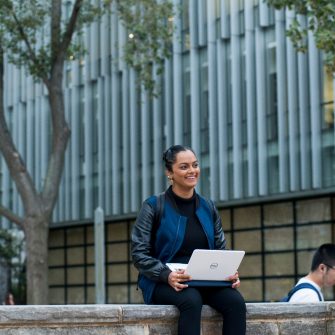Bachelor of Interior Architecture (Honours)
- Commencing Terms
- Term 1 & 3
- Duration
- 4 Year(s)
- Delivery Mode
- Face-to-face (includes blended)
- Campus
-
Kensington
- Codes
- UAC code 423400
- Program code 3256
- CRICOS code 088833J
-
ATAR/2025 lowest selection rank
- 80.0 View all admission criteria
-
2026 Indicative first year full fee
- $9,500*
-
2026 Indicative full fee to complete degree
- $40,000*
-
2026 Indicative first year full fee
- $51,000*
-
2026 Indicative full fee to complete degree
- $222,500*

Application closures for 2026
International applications for all undergraduate programs, as well as postgraduate programs offered by the faculties of Arts, Design & Architecture, Engineering (excluding Master of Information Technology and associated programs) and Science are now closed to New Overseas Student Commencement (NOSC) for 2026 intakes.
Postgraduate programs offered by the Business School and the faculties of Law & Justice and Medicine & Health remain open. Master of Information Technology (and associated programs) also remain open.
- Overview
- Entry requirements
- What will I study?
- Future careers
- How to apply
- Fees & Scholarships
Overview
Enhance the spaces where we live, work, and play with the Bachelor of Interior Architecture (Honours) from a school ranked #1 in Sydney and #23 globally for architecture & built environment (QS World University Rankings by Subject, 2025). Through a blend of creative thinking and practical application, you’ll study within a dynamic design community that reimagines and reshapes interior environments across homes, workspaces and cities.
You’ll develop a deep understanding of the environmental, cultural, and historical contexts of interior architecture and design. Tailor your studies to suit your passions, and deepen your expertise through a self-directed project and an optional minor in Construction Management and Property, Computational Design, Industrial Design, or Landscape Architecture. Take your studies even further with optional progression into a Master of Architecture.
From manipulating spatial, material, and structural elements to exploring interior architecture through both theory and practice, you’ll graduate with the confidence, connections, and career-ready skills to kickstart your career in interior architecture. You’ll also be eligible for membership with the International Federation of Interior Architects/Designers (IFI).
Key features
Recognised degree
UNSW’s Bachelor of Interior Architecture (Honours) is recognised by the Interior Designer/Interior Architecture Educators Association and the International Federation of Interior Architects (IFI).
Global learning opportunities
Engage in placements and internships in Australia and around the world. Our program will connect you with a wide array of industry, community, and exchange partners worldwide. You won’t just study and work internationally – you’ll build strong, lasting networks through our extensive industry links, partnerships, and a global network of world-class alumni.
Unrivalled industry partnerships
At UNSW Arts, Design & Architecture, we pride ourselves on our extensive industry partnerships. We collaborate with leading nonprofits, public sector organisations, and top corporations to stay ahead of industry trends. This means you’ll graduate with the skills and knowledge to tackle the challenges of tomorrow, supported by the best connections in the field.
Why study at UNSW?
World-class education
Learn from the best at a top-ranked university. UNSW’s School of Built Environment is ranked #1 in Sydney and #23 globally for architecture & built environment (QS World University Rankings by Subject, 2025) and we're also a global top 20 university (QS World University Rankings, 2025).
Industry-ready graduates
Thanks to our strong industry connections and hands-on learning approach, Our graduates are highly sought after by employers. In fact, our graduates’ practical experience and skills make them the most employable graduates in the country. We're ranked #1 in Australia for career outcomes (Australian Financial Review (AFR) Best Universities Ranking, 2025). Increase your employability by progressing to the Master of Architecture.
Join an inspiring community
As part of our vibrant Arts, Design & Architecture community, you’ll collaborate with interdisciplinary innovators and changemakers and make connections with classmates and professionals. Plus, tap into support from student associations like the Women in Built Environment Student Society, and more than 300 other university-wide clubs and societies.
Want to see more from UNSW Arts, Design & Architecture?
Entry requirements
-
- The 2025 Lowest Selection Rank (LSR) is the adjusted rank (ATAR plus adjustment factors) you would have needed to gain entry to this degree in 2025.
- The 2025 A levels score is based on four Advanced Level (A2) subjects. Entry scores are calculated from the best three or four A2 subjects (excluding repeated subjects) using the following values: A*=6, A=5, B=4, C=3, D=2, E=1. At most one Applied A Level subject may be included in the best four subjects used to calculate the aggregate.
- The 2025 IB Diploma is an indication of the IB you would have needed to gain entry to this degree in 2025. It is to be used as a guide only.
- The 2025 Lowest ATAR is the lowest ATAR (before adjustment factors were applied) to which an offer was made. Where <5 is listed, this indicates that less than 5 ATAR-based offers were made and so the score has not been published. N/A indicates no offers were made on the basis of ATAR.
*The Lowest ATAR to which an offer was made, for this program, is based on a UNSW Gateway Early Conditional Offer.
-
At UNSW, we are committed to ensuring prospective students have all the information they need in order to make informed decisions about their study options.
To assist you in gaining a better understanding of how Admissions works at UNSW, we have provided you with a summary of ATAR offers and the student profile.
We hope this information will help you identify the degree that is right for you.
Recognition of Prior Learning (RPL)
Domestic students are eligible to apply for the following volume of Recognition of Prior Learning (RPL) credits towards their UNSW degree that belong in the Faculty of Arts, Design & Architecture:
- 1-year Diploma: 48 UoC (equivalent to first year)
- 1.5-year Advanced Diploma/Associate Degree: Up to 72 UoC (equivalent to first year and a half)
- 2-year Advanced Diploma/Associate Degree: Up to 96 UoC (equivalent to two years)
Considering your previous qualifications and their relevance to the chosen program at UNSW, the type and amount of credit you can apply for, as well as the duration of your remaining program, will then be determined.
Assessment by the Program Director is required for RPL applications toward Professional Accredited programs. Please note that eligibility for the full volume of RPL may be subject to accreditation requirements.
Adjustment Factors
We offer a range of adjustment factor schemes that reward students for academic performance and extra-curricular achievements. These schemes also take into account a range of personal and educational disadvantages that may have affected your studies.
HSC Plus
This scheme rewards students who perform well in Year 12 subjects that are relevant to their preferred UNSW degree. You may be awarded up to five points.
Elite Athletes, Performers and Leaders (EAPL)
This program recognises achievements in the areas of sport, academia, leadership and music at an elite level. You may be eligible for up to five points.
Educational Access Scheme (EAS)
Factors such as illness, financial hardship, language difficulties or attending a particular school can mean you don't always get the best possible marks in Years 11 and 12. If one of these situations applies to you, submit an application for the Educational Access Scheme (EAS) via UAC. Eligible students can receive between 1 and 10 points towards their chosen UNSW degree.
Admission pathways
Portfolio Entry
At UNSW School of Built Environment, we recognise your creative potential. With BE Portfolio Entry, you can submit a portfolio of your best creative work to showcase your talent and boost your chance of admission. Learn more about BE Portfolio Entry.
UNSW also offers a number of other alternative entry schemes to support you in boosting your admission opportunities. Explore your alternative entry options.
TAFE/VET Pathway
This degree is eligible for the TAFE/VET Pathway. If you've completed a relevant TAFE/VET qualification, you may be eligible for automatic credit transfer. For more details, visit our TAFE/VET Pathway page.
University Preparation Program
This pre-university program is designed for high school leavers with an ATAR of 50 or above who have experienced educational disadvantage, as well as people aged 20 and over who are looking to return to education without an ATAR. Visit the entry requirements tab on our webpage to check your eligibility. You'll study specially-designed introduction university courses and discipline-specific courses in a supportive environment that will prepare you for a university degree.
English language requirements
You may be asked to provide evidence of your English proficiency to study at UNSW depending on your educational background and citizenship. English language skills are vitally important for coping with lectures, tutorials, assignments and examinations - this is why UNSW requires a minimum English language competency for enrolment.
If you’re completing an Australian Year 12 qualification (e.g. NSW HSC or equivalent), you do not need to provide anything extra to prove your proficiency. Your qualification will be used as evidence of your English proficiency.
If you do need to provide evidence of your English proficiency, this will be indicated in your application. You can prove this by providing evidence that you meet one or more of the following criteria:
- English language tests and university English courses
- Prior study in the medium of English
- Other qualifications
If you need to improve your English skills before you start your degree, UNSW College’s Academic English Programs are for you. The programs are suitable for various English levels and help you prepare for university studies and life in Australia.
For more details, visit the English Language Requirements page.
International direct entry
Information for applicants with CBSE, HKDSE or Singapore A Levels Qualification
Calculating your CBSE Score:
Awarded by CBSE, average percentage marks across English or Hindi, and your best four remaining subjects. Where marks are given as a range, the mid-point for that range is used e.g. 75 to 80 = 77.5.
Calculating your HKDSE Score:
Entry requirements are based on the aggregate of the best 5 achieved category A subjects (category B and C subjects are not considered).
For subjects other than Citizenship and Social Development: level 5**=7 points, level 5*=6 points, level 5=5 points, level 4=4 points, level 3=3 points, level 2=2 points, level 1=1 point, Level U=0 point.
For subject Citizenship and Social Development: Attained=2 points, Unattained=0 point. Citizenship and Social Development will only be counted towards the aggregate if the 2 points awarded for Attained ranks among the student’s best five scoring subjects.
If Mathematics Compulsory Part and Extended Part (Module 1 or 2) are both presented, both scores can be counted.
Calculating your Singapore A Levels:
Due to significant changes to the GCE A-Level Curriculum and University Admissions Score (UAS) calculation effective 2026, UNSW assessment is currently under review.
Note: Entry requirements published on this page are correct as of the day of publication and may change without notice.
We do not accept secondary qualifications from this country. We may accept tertiary study results, please contact us for more information.
Please contact us for direct entry requirements.
Recognition of Prior Learning (RPL)
Typically, international students are eligible to apply for the following volume of Recognition of Prior Learning (RPL) credits towards their UNSW degree that belong in the Faculty of Arts, Design & Architecture:
- 1-year Diploma: Up to 48 UoC
- 1.5-year Advanced Diploma/Associate Degree: Up to 72 UoC
- 2-year Advanced Diploma/Associate Degree: Up to 96 UoC
Generally, International students must ensure that their prior qualifications are assessed and deemed relevant to the program they intend to pursue. Additionally, they are required to maintain a full-time study load as part of the conditions for their Confirmation of Enrolment.
Admission pathways
UNSW College has university pathway programs that provide seamless transition to UNSW Sydney so you can achieve your academic and career goals. Learn more about UNSW College.
UNSW offers a number of other alternative entry schemes which could support you in boosting your admission opportunities. Explore alternative entry options.
English language requirements
You may be asked to provide evidence of your English proficiency to study at UNSW depending on whether you are from an English-speaking background or non-English speaking background. English language skills are vitally important for coping with lectures, tutorials, assignments and examinations - this is why UNSW requires a minimum English language competency for enrolment.
If English is not your first language, you’ll need to provide proof of your English proficiency before you can be given an offer to study at UNSW. You can do this by providing evidence that you meet one or more of the following criteria:
- English language tests and university English courses
- Prior study in the medium of English
- Other qualifications
If you need to improve your English skills before you start your degree, UNSW College’s Academic English Programs are for you. The programs are suitable for various English levels and help you prepare for university studies and life in Australia.
For more details, visit the English Language Requirements page.
Check the specific English language requirements for this program
What will I study?
UNSW is introducing a new academic calendar from 2028.
We are moving to a new flex-semester calendar. What does this mean for your studies?
The Bachelor of Interior Architecture at UNSW is taught through a combination of theoretical and practical study, as well as real-world experiences through Work Integrated Learning (WIL) and professional placements. We take a research-led creative practice approach to learning, where expansive thinking, rigour and risk taking are all encouraged.
Consisting of 12 core courses, eight design practice courses and eight electives courses, enjoy the structure and support that helps you set the foundation of your learning, and later the flexibility to choose subjects and courses that speak to your passions and future goals. You can tailor your degree to your interests, deepening your knowledge of interior architecture by delving further into your own design practice through a self-directed project.
Importantly, you won’t just graduate with an honours level outcome, you’ll have the opportunity to increase your employability even further through an optional progression into the Master of Architecture. You'll also have the option to minor in Computational design, Construction management, Industrial design or Landscape architecture.
Full program structure
This program contains a total of 192 units of credit (UOC) and can be completed in 4 years with full-time study or 6-8 years with part-time study. Students must complete:
Core courses – 168 UOC
- Communication in the Built Environment
- Principles of Sustainable Design
- Interior Architecture Composition 2
- Interior Architecture Critical Perspectives 2
- Interior Architecture Practice Studio 1
- Interior Architecture Practice Studio 2
- Interior Architecture Technics 1
- Interior Architecture Technics 2
- Interior Architecture Composition 3
- Interior Architecture Critical Perspectives 3
- Interior Architecture Critical Perspectives 4
- Interior Architecture Practice Studio 3
- Interior Architecture Practice Studio 4
- Interior Architecture Technics 3
- Interior Architecture Technics 4
- Parametric Design and Digital Fabrication
- Interior Architecture Practice Studio 5
- Interior Architecture Practice Studio 6
- Interior Architecture Practice Studio 7
- Interior Architecture Practice Studio 8
- Practice of Interior Architecture
Optional minor - 24 UOC
- Computational design
- Construction management
- Industrial design
- Landscape architecture
Built Environment electives – 24 UOC
ADA Professional Placement
Free elective courses – 12 UOC
Students must take at least 12 UOC of free electives.
General Education – 12 UOC
General Education courses for this program are any that do not contain the subject area: ARCH, BEIL, BENV, BLDG, CODE, FADA, IDES, INTA, LAND, PLAN
Sample program
Each university year at UNSW has three terms and an optional summer study period. You can study full-time or part-time.
Some courses need to be studied in your first and second year, so you’re prepared for courses that can only be studied in later years. Depending on how you plan your study load, you can fit two or three courses into a term and one course in a summer term.
Below is an example of what you could study in a standard four-year, full-time study plan for the Bachelor of Interior Architecture (Honours).
First year
- 2 Design Practice courses
- 4 Level 1 Interior Architecture core courses
- 2 Level 1 Built Environment core courses
Second year
- 2 Design Practice courses
- 5 Level 2 Interior Architecture core courses
- 1 Level 1 Built Environment core course
Third year
- 2 Design Practice courses
- 1 Interior Architecture core course
- 4 Elective, General Education or Interdisciplinary courses
Fourth year
- 2 Design practice courses
- 3 Elective, General Education or Interdisciplinary courses
See our sample degree structure, or for full course listing, descriptions and timetables please see the UNSW Online Handbook.
If you’re thinking about continuing onto the UNSW’s Master of Architecture, the program structure will include:
Third year (pathway to Master of Architecture)
- 2 Bachelor of Architectural Studies Design Studio courses
- 2 Bachelor of Architectural Studies core courses
- 1 Interior Architecture core course
- 2 Free, General Education or Built Environment Electives
Fourth year (pathway to Master of Architecture)
- 2 Design Studio courses
- 1 Bachelor of Architectural Studies core course
- 2 Free, General Education or Built Environment Electives
See our sample degree structure for the Master of Architecture Pathway.
Future careers
From the first to the last day of your UNSW Bachelor of Interior Architecture (Honours), you’ll learn from industry experts and gain hands-on experience that will equip you with the skills to kickstart an interior architecture career.
With jobs in interior design predicted to grow by almost 20% over the next five years, a Bachelor of Interior Architecture from UNSW will give you more than just a foot in the door – it will prepare you for a career that positively influences lives for the better by enabling you to design and improve the interior spaces others inhabit and call their own.
Potential careers
- Consultant
- Corporate Interior Designer
- Exhibition Designer
- Furniture Designer
- Hotel Designer
- Interior Designer
- Lighting Designer
- Project Manager
- Retail Space Designer
- Set Designer
- Sustainable Design Consultant
- Urban Designer
Our alumni
"Gaining practical experience in my field while studying provided me with a deeper understanding of the material and its real-world applications. It also helped me connect the dots between classroom learning and industry practice."
Cassandra Whatson
Interior Designer/Draftsperson
Studio xOx
Professional credentials
When you graduate you'll be eligible for membership with the Interior Design and Interior Architecture Educators Association and the International Federation of Interior Architects/Designers (IFI).
How to apply
Applications for undergraduate study from domestic students (Australian citizens, Australian permanent residents, Australian permanent humanitarian visa holders and New Zealand citizens) are processed by the Universities Admissions Centre (UAC).
Visit the Apply section of the UAC website and you can nominate up to five degrees in order of preference, with the first being your most desired degree and university.
On-time applications for admission usually close at the end of September each year for Term 1 admission. Late applications can be submitted, but a late fee will apply. For study starting in Term 1, the majority of offers are made in December and January. Visit the UAC website for key dates for admission outside of Term 1.
Ready to start your application?
For most international students, applications are submitted via our Apply Online service. We encourage you to submit your completed application as early as possible to ensure it will be processed in time for your preferred term.
Some high-demand programs with limited places, may have an earlier application deadline or may have an earlier commencement date. For details, visit the international admissions information page.
*If you are an international student studying an Australian qualification, go to the Universities Admission Centre (UAC) for application and UAC key dates. Note: If you are under 18 years of age, you need to make special arrangements. For details, visit the under 18 international students page.
Ready to start your application?
Fees & Scholarships
Commonwealth Supported Place: Student Contribution Band 2
*The student contribution for a Commonwealth Supported Place is an indication only of the amount payable in Year 1 based on a standard full-time load of 48 credit points (1.0 EFTSL). The actual student contribution you will be liable for depends on your individual program of study and the calendar year in which you enrol. Actual fees are calculated upon enrolment. Student contribution amounts are subject to annual review by the university and may increase each year during your studies (subject to caps determined by the Australian Government), effective at the start of each calendar year.
The indicative fees listed here are based on an estimated average and are for tuition only - other fees and charges are not included.
*Fees are subject to annual review by the University and may increase annually, with the new fees effective from the start of each calendar year. The indicative fees listed here are based on an estimated average and are for tuition only, other fees and charges are not included. The amount you pay will vary depending on the calendar year to enrol, the courses you select and whether your study load is more or less than 1 Equivalent Full Time Student Load (8 courses per year).
Indicative fees are a guide for comparison only based on current conditions and available data. You should not rely on indicative fees. More information on fees can be found at the UNSW fees website.
Indicative fees to complete the program have been calculated based on a percentage increase for every year of the program. Fee increases are assessed annually and may exceed the indicative figures listed here.
Indicative fees to complete the program include tuition plus an estimate of study-related costs of approximately $1,000 per year. To find out more about other costs, visit UNSW International.
Scholarships
At UNSW, we award over $83 million in scholarships each year. We pride ourselves on rewarding excellence and making university accessible to students from all walks of life. Whether you’re a domestic or international student, our range of scholarships, prizes and awards can support your journey.
Progress starts here – at a world-leading university

Top 20 Worldwide
UNSW is ranked #20 university in the world
QS World University Rankings, 2024–2026

Most Employable Graduates
Winner of the AFR Most Employable University Award seven years in a row
AFR Top100 Future Leaders Awards, 2020–2026

Australia's #1 for Innovation
Highest number of startups and spinouts from university-developed tech
SCOPR report, 2024





